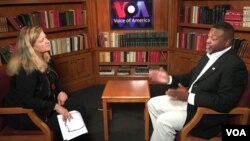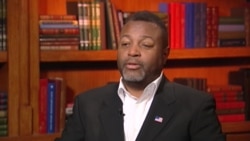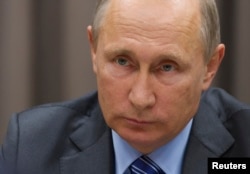Malcolm Nance is extremely worried about what might happen as U.S. votes are tallied on Nov. 8, election night.
A career U.S. counterterrorism and intelligence official with 33 years of experience, Nance said he had overwhelming evidence that Russia is seeking to interfere in U.S. elections to put "not just a finger, but their whole hand" on the scale to help Republican nominee Donald Trump and hurt Democratic nominee Hillary Clinton.
Nance said a number of private companies had traced cyberattacks exposing potentially damaging Democratic Party emails and voicemails back to cyber "fingerprints" clearly identified in the past as those of Russian state hackers. He said the same fingerprints were found in what turned out to be Russian hacking of power plants in Ukraine and of the German parliament.
Nance outlined his evidence in a book published this week, The Plot to Hack America.
Interference to date
Last Friday, the Homeland Security Department and the director of national intelligence put out a joint statement formally accusing Russia of hacking into the computers of U.S. political organizations, including the Democratic National Committee, and orchestrating the release of the contents in conjunction with WikiLeaks.
Earlier this week, Russian President Vladimir Putin dismissed the accusations, saying interfering in the U.S. election would not be in Russia's interest. Putin said U.S. authorities should pay more attention to the content of the emails, instead of who had taken and exposed them.
Trump has also repeatedly questioned why Clinton and others say that Russia is behind the attacks, and he has expressed admiration for Putin as a strong leader. Trump campaign surrogates say Clinton is simply trying to distract from the contents of the emails.
Current Clinton campaign chairman John Podesta said a Federal Bureau of Investigation probe into his emails was part of a broader investigation into Russian cyberattacks. Podesta claimed longtime Trump adviser Roger Stone had "advance knowledge" of the leaks. Stone has admitted he is in contact with WikiLeaks founder Julian Assange.
Florida system
U.S. federal investigators believe Russian hackers are also behind cyberattacks on a contractor for Florida's election system that may have exposed the personal data of Florida voters.
Nance said Russian military intelligence also attempted cyberattacks on voter databases in Illinois and Arizona. Illinois officials said data on about 90,000 people might have been breached, while Arizona officials said they saw no indication that hackers had succeeded in accessing data in their systems.
Several states across the country have reported scans of their computer systems, which is often a precursor to a breach.
Nance told VOA he was not worried that Russian agents would attempt to hack into individual voting machines. What he fears is cyber mischief at a state level that could discredit the results.
"It's far easier to create mayhem and chaos on Election Day by, at the end of the day, going to a state which is controversial, like Florida, Ohio or Pennsylvania, where Donald Trump has said he expects the state to be stolen," he said.
All it would take is hacking into the computer on which the state calculates its results, and "removing some digits from one column and then putting them in another column and then moving them back 5 minutes later so that people know it's a hack, all right?" Nance said.
'It would create chaos'
What would that do? "It would create chaos in the entire electoral process, and it would give one side the ability to claim that the election has been invalid and should be done again," he said, "and that could literally create a constitutional crisis in the United States, if not civil disobedience and violence."
Nance rejected assertions that he was accusing Russia of supporting Trump for political reasons.
"This is not a partisan issue. Someone — a foreign intelligence agency at the bequest of a former director of the KGB [the main security agency for the former Soviet Union] — is attempting to hijack the American electoral system for the first time in 240 years," he said.
Brookings Institution foreign policy expert Thomas Wright told VOA he didn't know about the technicalities of cyberattacks, but he did say Trump and Putin have similar worldviews, since Trump opposes NATO and other U.S. military alliances in Europe and Asia and has long expressed respect for authoritarian figures.
He said the hacking allegations had shined a light on the vulnerabilities of the U.S. electoral process.








